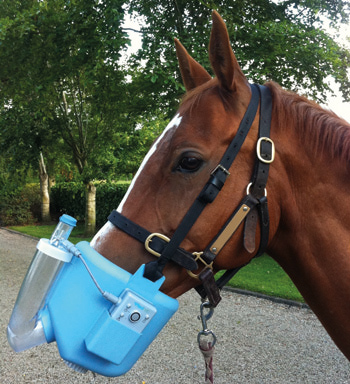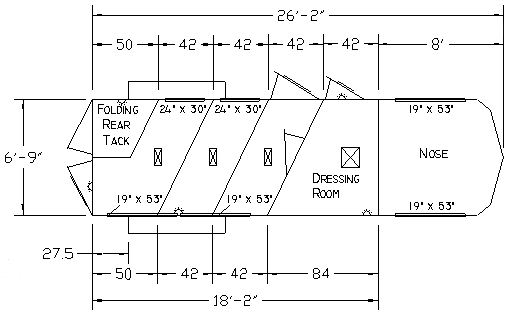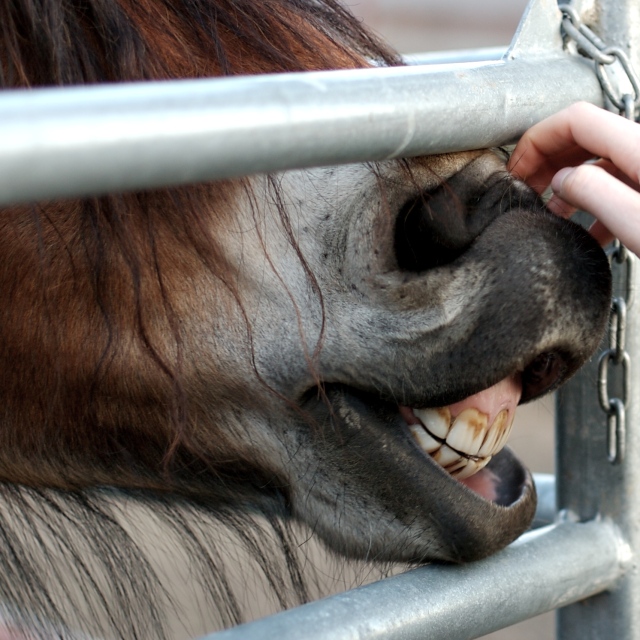QuestionQUESTION: I'm 38 years old and just learning about training horses. I have grown up riding mules, just for pleasure, and my folks raise mini horses. I am currently working with a 7 month old filly who has been handled by people since she was born. She was weaned about 1 month ago...She is currently kept in a pen alone at night and tied out to graze during the day. There are other horses nearby, but not directly with her. I am having a problem with her attempting to kick at people from time to time. She'll run and throw her feet when someone is leaving her pen or try to get her rump around to kick at you when you lead her. We have swatted her with a short rope on the butt when she does this. She also is still a little nippy. We swat her nose for this and it is improving but we have to watch her. How do we fix these issues? What are we doing wrong? I've worked with other young mini's and they aren't ususally so apt to throw their feet like this one. However, the imprint training is new to us and this particular horse. Could the imprint training have taken her natural fear away enough where she is more comfortable kicking at us? Please help me.
ANSWER: This horse is being a normal horse. Putting her out with a gelding or other horse will help teach her some manners. This is a common problem with little ones being handled by people, especially people that don't understand a horse. Nature tells horses to test their leaders all the time to make sure the strongest and smartest is in charge.
What you call swatting her with a rope is what I call annoying her. She needs to have that butt attacked and hit with a rope as hard as you can, that will scare her and she will know that turning her butt is unacceptable. When she puts that butt to you, you scream and act crazy like she tried to kill you, attack her her butt aggressively and pull her head to you, this will cause her butt to move away from you, once she faces you, stop and do nothing like it never happened.
The same with biting, if she nips you must correct it as she about to nip or as she touches you, any later is too late, timing is critical. She must associate the elbow, punch, palm strike, or blade strike with the bite. Being easy on these issues is a big mistake. If she did this to a higher horse in the pasture, she would be a chunk taken out of her with a hard bite or get kicked into next week and she would stop and not do it again. The more aggressive you are at first the less you will have to do it again.
Read my horsemanship page on my site about herd behavior and then treat her like a member of her herd would treat her, like a higher member of her herd, you never want her to see you as lower, she will always test you, but you have to maintain that higher position in her herd for your safety and her safety.
This is nothing more a respect issue, put her with other horses so she can learn from them, then you can use what they teach her. Geldings make good babysitters and will play with her and teach her things. Don't throw her with a group at first or they may overwhelm her and she will not know what to do, so first with one horse, then two and so on. You will tell when she has it and can fend for herself.
Hope this helps,
Rick
---------- FOLLOW-UP ----------
QUESTION: I really appreciate your time and advice. I do understand about respect in a herd, I just wasn't sure about how much force to use when working with her. She actually did pretty well when I worked with her tonite. No nippy stuff and no kicky stuff. I actually had smacked her behind pretty darn good a night or two ago, I just was afraid to admit it and I did lose my temper with her a little that night and knew I shouldn't have...which lead me to you. I did notice tonite that she's trying to rush along when I'm walking her, especially toward her pen. I turn her away from the pen when she does this and go in the opposite direction and have been flicking a rope in front of her nose to make her slow down. Is there a better way? And I will put her in with another horse. I don't have a gelding. I have a yearling and a three year old available. Both mares. Would the yearling be better? Again thanks for all the advice. I am new to this training stuff and I want to do a good job. I
ANSWER: It's ok to admit you lost it, we all do it but it is not good and not something we want to accept or do routinely. It is better to quit before you lose it, but is easier said than done. It is better to smack her butt good and hard and not be mad. That way she knows what to expect and knows you don't have to be mad to do it. Be consistent. A smack is a smack, it does not matter if you are mad or not, it only matters if you are consistent and fair to the horse so they know what to expect. Like with other horses, they do not get mad, they ask once with ears back, then ask again with tail swish, then they kick or bite, they do not get mad they just do the same thing all the time so the other horses always know what to expect, it is not personal, it is just horses being horses.
It is much better to discipline a horse hard and fair than in anger and unfair. A horse should never be surprised, he should know what to expect and know or have a good idea of what is going to happen next.
Flicking the nose with a rope is not good, the horse will not know what that means, you have to have a cue and teach the horse not to lead you. Don't do anything to a horse unless it is a clear cue, the face is never hit except for biting, period. You will make a horse head shy and it will not know when or why it gets hit in the face, only hit the face (mouth) if the horse bites you.
To make a horse slow change directions, if the horse gets in front of you stop and make the horse back up, use a cue to let the horse know what you want, turn to your left and have the horse follow you in a circle so it can not pass you, take one step and say Whoa and have the horse stop, take two steps and stop, then walk and if she gets too close to passing you, stop, ask her to back up a step or two, every time you move her feet, she knows you are leader and in charge, so if she tries to pass you stop and have her back up, calmly, don't get mad.
I would put her with three year old, the yearling will only get pushed around and might make her more dominant. If you are well established as the leader she will not challenge much and it will be very small test.
Read, Read and Read about horse behavior so you start to think like a horse in a herd. The more you act and think like a horse the more the horse will predict what you want and what to do.
Rick
---------- FOLLOW-UP ----------
QUESTION: I'm confused. My little one I'm working with is 7months old. I thought the year old mare would be more dominant than the 7month old mare? And I thought the older mare might be too agressive? And on that subject, we have a mare who is 4 years old that our herd of mares and stud consistently runs out of the fences. We've left her in there to establish a pecking order, but she always gets run out. Sometimes it's a week, sometimes it's a month, we put her back and it happens all over again. My dad is sick of mending fences and has thought of selling her, but I think there has to be a reason. Any thoughts? P.S. I did go to your website and found lots of good advice. Thank you so much.
AnswerSorry you are correct, I was did not check the age of your horse and the one year old would be better for seven month, however, a three year would be ok if she was not too aggressive, if they know each other and familiar then it should go good, you can watch them and tell in very quickly if the little one knows how and is willing to move away from higher horse. I would put all three horses together let them have a herd of three. Herd will work out in a few days if they are left alone, when we try to help or protect or change things, we mess things up.
As for your herd of mares and stud???? I am confused, you keep your stud with mares all the time???
Who is running mare out, stud or other mares, most studs will not run mares out the like to collect more...
Studs will get all mares in area fired up when they go in heat, so having a stud around is always extra problems, not to mention that studs will dislike and abuse geldings, since they do not know what a gelding is, all they know is if you are not a mare, I must run you off.

 nutrition
Question
Prova dos Tratadores
I am taking olive leaf ex
nutrition
Question
Prova dos Tratadores
I am taking olive leaf ex
 remedy for caugh and cold
Question
nebulizer
hello maam. what is the remed
remedy for caugh and cold
Question
nebulizer
hello maam. what is the remed
 characteristics of a horse float
QuestionQUESTION: hello madam, can you please get me th
characteristics of a horse float
QuestionQUESTION: hello madam, can you please get me th
 straight tail carriage
Questionstraight tail
QUESTION: hello maam. i ha
straight tail carriage
Questionstraight tail
QUESTION: hello maam. i ha
 horse age
Question
horse age
hello, can you guess the horse age?
horse age
Question
horse age
hello, can you guess the horse age?